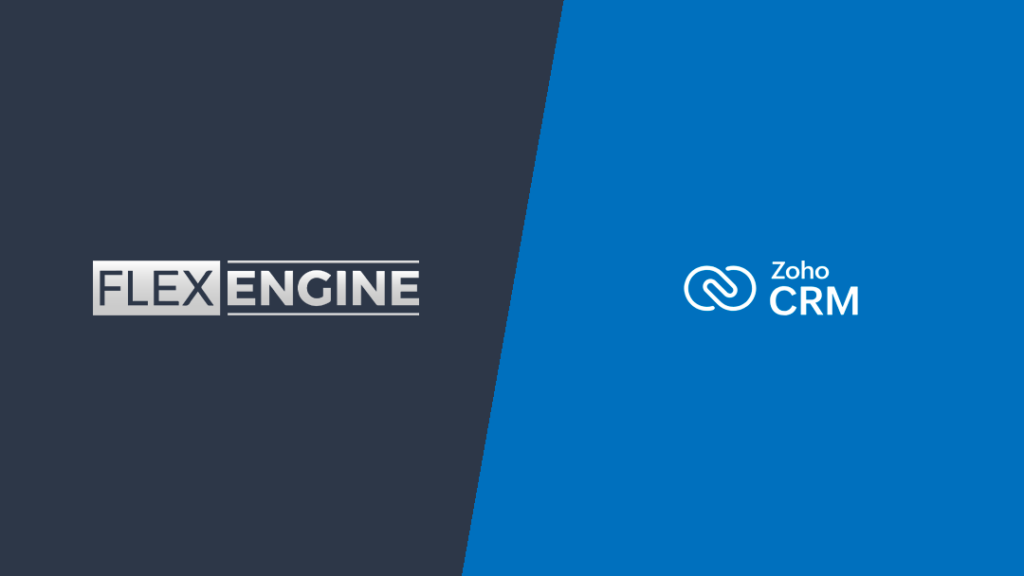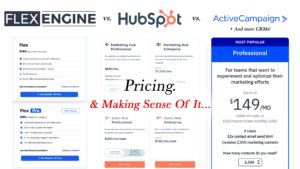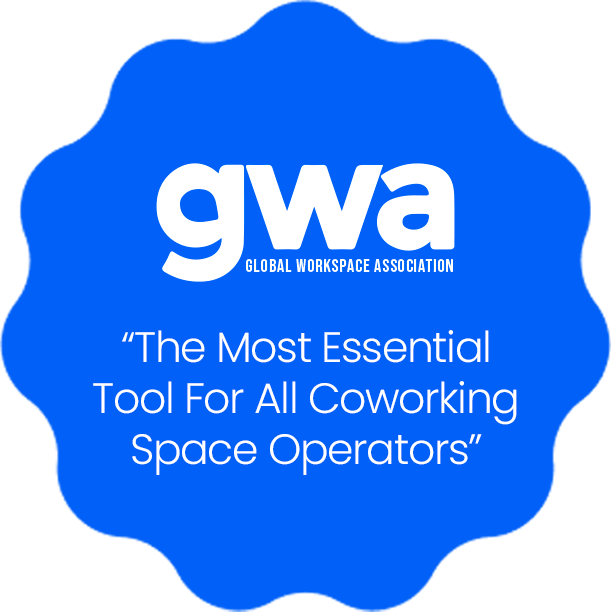When it comes to Customer Relationship Management (CRM) software, businesses are faced with a plethora of choices. Two prominent players in this domain are Zoho CRM vs Flex Engine. In this comprehensive comparison, we will delve into the features, functionalities, and unique aspects of each CRM to help businesses make an informed decision based on their specific needs.
Introducing The Best CRM Software: Zoho CRM vs Flex Engine
For businesses of all sizes, having a customer relationship management (CRM) system in place is essential. A reliable CRM not only helps track and manage customer interactions but also streamlines sales processes, enhances customer support, and boosts overall productivity. With so many CRM options available in the market, it can be overwhelming to choose the right one for your business. In this article, we will delve into two popular CRM systems – Zoho CRM vs Flex Engine – and compare their features, functionalities, and unique aspects. By the end, you will have a comprehensive understanding of both CRMs, enabling you to make an informed decision based on your specific needs. So, let’s dive in and explore the world of Zoho CRM and Flex Engine to unlock their potential for your business.
Zoho CRM: A Powerhouse of Customization and Integration
Zoho CRM has earned its reputation as a versatile CRM solution suitable for businesses of all sizes. One of its standout features is the extensive customization options it offers. Businesses can tailor their CRM environment by creating custom modules, fields, and layouts, aligning the CRM with their unique processes.
Marketplace Integrations:
Zoho CRM’s marketplace is a treasure trove of integrations, extensions, and add-ons. This flexibility allows users to extend the functionality of the CRM, integrating it seamlessly with various third-party tools and applications. Whether it’s marketing automation, accounting software, or collaboration tools, Zoho CRM provides a broad spectrum of integrations to cater to diverse business needs.
Workflow Automation:
Efficiency is the key, and Zoho CRM recognizes this by providing advanced workflow automation capabilities. Users can create and automate complex business processes, streamlining tasks, and reducing manual efforts. This not only enhances productivity but also ensures that every stage of the customer journey is well-coordinated.
AI-Powered Insights:
Zoho CRM incorporates Artificial Intelligence (AI) features to provide valuable insights and predictions based on customer interactions. This predictive analysis helps businesses make informed decisions, prioritize leads, and take actions that contribute to stronger and more fruitful customer relationships.
Scalability:
Zoho CRM is designed to grow with your business. Its scalability ensures that the CRM remains a relevant and effective tool as your organization evolves. Whether you’re a small startup or an established enterprise, Zoho CRM can adapt to your changing requirements.
Flex Engine CRM: Unifying Communication and Streamlining Operations
Flex Engine CRM takes a unique approach by offering a unified communication hub. It excels in consolidating various communication channels, making it a central platform for managing customer interactions. Let’s explore the distinctive features that set Flex Engine apart.
Unified Communication Hub:
Flex Engine stands out with its emphasis on a unified communication hub. It seamlessly integrates phone calls, text messages, and emails within the CRM. This consolidated approach ensures that all customer interactions are centralized, making it easier for teams to manage and respond to inquiries effectively.
Calendar Management and Booking:
Flex Engine provides comprehensive calendar features, facilitating efficient management of appointments, tours, and events. This includes options for booking systems with customizable forms and calendars, particularly beneficial for businesses that rely on appointment scheduling.
Automated Tracking and Reporting:
Automation is a key theme in Flex Engine. The system automatically updates contact opportunity stages, ensuring that users stay organized and focused on leads that are more likely to convert. Detailed reporting features further contribute to performance analysis, offering insights into what works and what needs improvement.
Conversation AI and ChatGPT:
Flex Engine incorporates advanced AI features, such as Conversation AI and ChatGPT. These tools automate appointment booking, answer frequently asked questions, and even generate responses for emails. This not only saves time but also enhances the efficiency of customer interactions.
Media Library and Social Media Posting:
Flex Engine caters to the marketing needs of businesses with features like a media library and social media posting capabilities. The media library simplifies the storage and utilization of images and videos across various channels, while social media posting streamlines content management.
A Comparative Analysis of Key Features: Zoho CRM vs Flex Engine
Communication and Collaboration:
Zoho CRM: Zoho CRM offers communication features, including email integration and social media engagement. However, its focus is more on data-driven insights and workflow automation than on consolidating communication channels.
Flex Engine: Flex Engine takes a communication-centric approach, providing a unified hub that integrates phone calls, text messages, and emails. This centralized platform is particularly beneficial for businesses looking to streamline communication and enhance collaboration.
Customization and Scalability:
Zoho CRM: Zoho CRM is renowned for its customization capabilities. From custom modules to fields and layouts, businesses have the freedom to tailor the CRM to their specific needs. Additionally, Zoho CRM is scalable, making it suitable for businesses at various stages of growth.
Flex Engine: While Flex Engine offers customization options, its primary focus lies in providing a unified and streamlined CRM experience. It may be more suitable for businesses that prioritize communication and booking functionalities over extensive customization.
Automation and AI-Powered Insights:
Zoho CRM: Zoho CRM excels in workflow automation, allowing businesses to automate complex processes. It also leverages AI for predictive insights, helping users make data-driven decisions.
Flex Engine: Flex Engine integrates AI features such as Conversation AI and ChatGPT for automation. These tools automate appointment booking, FAQs, and even generate responses. The emphasis is on automating communication processes for efficiency.
Booking and Calendar Management:
Zoho CRM: While Zoho CRM offers calendar features and scheduling capabilities, its strengths lie more in data management and analytics rather than advanced booking functionalities.
Flex Engine: Flex Engine shines in calendar management and booking capabilities. It is well-suited for businesses that require efficient scheduling and booking systems, such as coworking spaces or those offering appointments.
Social Media and Media Library:
Zoho CRM: Zoho CRM provides social media engagement features, allowing users to connect with leads on platforms like Twitter and Facebook. However, its focus is broader, encompassing the entire CRM ecosystem.
Flex Engine: Flex Engine includes a media library and social media posting capabilities, catering specifically to the marketing needs of businesses. This makes it a suitable choice for those prioritizing social media management.
Use Cases and Industry-Specific Considerations: Zoho CRM vs Flex Engine
Zoho CRM: Ideal for Data-Driven Businesses
Zoho CRM is an ideal choice for businesses that prioritize extensive data management, analytics, and workflow automation. Its customization options make it versatile across industries, and its AI-powered insights contribute to informed decision-making.
Use Cases:
-
- Sales-focused organizations require advanced analytics.
-
- Businesses with complex workflow automation needs.
-
- Companies with diverse integration requirements from the marketplace.
Industries:
-
- Sales and Marketing Agencies.
-
- E-commerce Businesses.
- Service-oriented Enterprises.
Flex Engine: Tailored for Communication and Booking
Flex Engine is well-suited for businesses that prioritize communication, appointment scheduling, and streamlined booking processes. Its unified communication hub and advanced AI features make it a valuable asset for those emphasizing customer interaction.
Use Cases:
-
- Coworking spaces with appointment-based tours.
-
- Businesses need streamlined communication.
-
- Companies with a focus on social media marketing.
Industries:
-
- Coworking Spaces.
-
- Service Industries.
- Marketing Agencies.
Pricing Models and Flexibility
Zoho CRM offers a tiered pricing structure with plans catering to different business sizes. The plans include a free version for basic needs and paid plans with advanced features. The pricing is flexible, allowing businesses to choose the features that align with their requirements.
Flex Engine follows a credit system, where users purchase credits based on their usage. This can be advantageous for businesses with varying needs, allowing them to adjust their usage and expenses accordingly. The pricing model may be particularly appealing to those looking for flexibility.
User Interface and Ease of Use
Zoho CRM boasts a clean and intuitive user interface. The navigation is user-friendly, and the layout is designed to enhance user experience. The customization features may require a learning curve, but the platform provides extensive resources for users to get acquainted with its functionalities.
Flex Engine also offers an intuitive user interface with a focus on simplicity. The emphasis on communication and booking features is reflected in the design, making it easy for users to navigate and utilize the CRM effectively. The platform aims to minimize complexity for a seamless user experience.
Integration Ecosystem
Zoho CRM:
Zoho CRM’s integration ecosystem is vast, with a marketplace that includes numerous third-party applications. This enables users to connect Zoho CRM with tools such as marketing automation platforms, accounting software, and collaboration tools. The extensive integration options contribute to the CRM’s adaptability to various business needs.
Flex Engine:
While Flex Engine may not have as extensive a marketplace as Zoho CRM, it focuses on essential integrations for its target functionalities. The CRM integrates with communication channels, calendars, and social media platforms, aligning with its emphasis on communication and booking processes.
Zoho CRM vs Flex Engine: Choosing the Right CRM for Your Business
In conclusion, the choice between Zoho CRM and Flex Engine depends on the specific needs and priorities of your business. Zoho CRM stands out with its customization prowess, workflow automation, and AI-driven insights, making it suitable for data-driven businesses with diverse integration requirements.
On the other hand, Flex Engine excels in communication-centric features, calendar management, and booking functionalities. Its focus on AI-powered automation for communication processes and marketing-related features makes it an excellent choice for coworking businesses looking to streamline customer interactions.
It’s essential to regularly review and reassess your CRM choice to ensure it continues to meet your evolving needs. As your business grows and changes, your CRM should be able to adapt and scale accordingly. By regularly evaluating the performance and effectiveness of your CRM, you can make informed decisions and optimize your customer management processes.
Consider your industry, business size, and the core functionalities that matter most to your operations. Whether it’s advanced customization, extensive data analytics, or streamlined communication, both Zoho CRM and Flex Engine bring unique strengths to the table. Carefully evaluate these aspects, and you’ll find the CRM solution that aligns perfectly with your business goals.
Why Flex Engine is Perfect for Coworking Companies
Flex Engine CRM is tailor-made for the unique needs and challenges faced by coworking companies, setting it apart as the superior choice in the industry. Flex Engine is the perfect solution for coworking companies due to its unparalleled flexibility and efficiency. Traditional coworking management systems often have their limitations and lack the adaptability needed in a dynamic and constantly evolving industry. Flex Engine, on the other hand, offers a wide range of features that are specifically designed to address the unique needs of coworking spaces.
One of the key advantages of Flex Engine is its ability to effortlessly manage multiple locations. Coworking companies often expand to multiple sites as their business grows, and having a management system that can handle this expansion seamlessly is crucial. Flex Engine allows coworking companies to easily manage different locations from a single platform, streamlining operations and ensuring consistency and efficiency across all sites.
In addition to its multi-location management capabilities, Flex Engine also offers advanced booking and reservation features. Coworking spaces thrive on providing a flexible and convenient workspace experience for their members, and Flex Engine facilitates this by enabling quick and hassle-free scheduling. Members can easily book workspaces, meeting rooms, and other amenities through a user-friendly interface, saving time and enhancing their overall coworking experience.
Furthermore, Flex Engine provides robust reporting and analytics features that allow coworking companies to gain valuable insights into their business performance. By tracking key metrics such as occupancy rates, revenue generation, and member retention, coworking companies can make data-driven decisions to optimize their operations and attract new members. This level of data visibility and analysis is essential for staying competitive in the coworking industry.
Here’s a detailed explanation of why Flex Engine is better suited for managing coworking spaces:
Industry-Specific Features:
Flex Engine recognizes that coworking spaces have distinct requirements compared to other businesses. It comes equipped with specialized tools designed to meet the specific demands of managing shared workspaces. From booking management to membership tracking, every feature is finely tuned to enhance the coworking experience.
Specialized Booking Calendars:
The booking calendars in Flex Engine go beyond basic scheduling. They include specialized options such as round-robin, class booking, and collective calendars. These features allow coworking managers to efficiently allocate resources, optimize space usage, and streamline reservations, addressing the dynamic nature of coworking environments.
Customization Options:
Flex Engine understands that each coworking space has its unique characteristics. The CRM provides a high degree of customization, allowing managers to tailor the system to their specific needs. This flexibility ensures that the CRM adapts to the nuances of each coworking environment, offering a personalized and efficient solution.
Payment Management:
Financial transactions are central to coworking spaces. Flex Engine simplifies payment management with its Payments Manager. Whether it’s creating one-off or recurring products and invoices, this feature streamlines financial processes, providing a seamless experience for both managers and members within coworking spaces.
Integration with Google Business Profile:
Flex Engine integrates seamlessly with Google Business Profile, allowing for direct bookings from search without incurring significant commissions. For coworking spaces aiming to attract new members without the financial burden of commission fees, this integration provides a competitive advantage, making it a cost-effective solution.
Conversation AI for Appointment Booking:
Flex Engine introduces Conversation AI, an innovative tool that streamlines appointment booking. Whether it’s reading calendar times or sending a booking link, this AI-driven automation enhances the efficiency of managing appointment bookings for coworking space tours. It ensures a smooth and responsive process, crucial for converting leads into members.
Comprehensive Workflow Automation:
The Workflow Builder in Flex Engine goes beyond standard CRM capabilities. With over 55 triggers and 70+ actions, coworking spaces can create fully customized automation to streamline marketing, sales, and operations. This level of automation ensures that processes are not only efficient but also tailored to the specific needs of coworking management.
AI-Powered Advancements:
Flex Engine leverages artificial intelligence with features like ChatGPT integration, AI text generation, and image creation. These advancements enhance communication, streamline marketing efforts, and provide valuable insights. For coworking spaces aiming to stay ahead in the industry, these AI-powered features offer a competitive edge.
In conclusion, Flex Engine provides coworking companies with a comprehensive solution that addresses the unique challenges they face. Its flexibility, multi-location management capabilities, advanced booking features, and robust reporting make it the ideal choice for managing coworking spaces of any size. With Flex Engine, coworking companies can streamline their operations, enhance member experiences, and stay ahead of the curve in the ever-evolving coworking industry.





